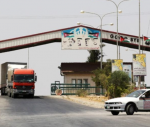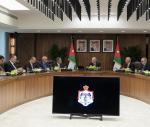You are here
Political future of Biden, Taliban depends on what happens to Afghans
Aug 26,2021 - Last updated at Aug 26,2021
The political future of both US President Joe Biden and the leaders of the Taliban depends on what happens to the people of Afghanistan. Biden did not take their welfare into consideration when he implemented Donald Trump's bad deal for a precipitate US troop withdrawal from Afghanistan. The Taliban's senior leadership which was based outside the country did not make even general plans for governance because they did not expect their fighters to take over the country as quickly as they did.
As far as Biden is concerned, the rapid pull-out of the last 2,500 US troops was a disaster as he both gave the Taliban the victory they craved and humiliated the US military, the mightiest (allegedly) and most expensive in the world. Biden's handling of the withdrawal has been exposed as horrendous by satellite television by the chaotic crush of foreigners and frightened Afghans outside the airport in Kabul. Biden's hope of declaring "mission accomplished" has been dashed. The world will wait to see what happens next to the hard-pressed Afghan people who have been returned to Taliban rule after 20 years of governance by a corrupt leadership. Despite mis-management, the US-backed regime improved living conditions for Afghans living in towns and cities but neglected the rural areas where the Taliban rebuilt its base of support after being driven into exile by the US in 2001.
A comprehensive CBS/YouGov opinion poll conducted between August 18-21 shows that while 67 per cent of US respondents approves of withdrawing from Afghanistan, 43 per cent is critical of Biden's handling of the process of removal. Forty-four per cent says he has handled it very badly, 30 per cent somewhat badly, 21 per cent somewhat well, and 5 per cent well. Seventy-four per cent says the way the US pulled out its troops has gone badly.
Only 33 per cent believes Biden has a clear plan for evacuating US citizens while 67 per cent says he does not. Fifty-nine per cent holds the US was not doing enough to help Afghans to leave, 27 per cent says the US was doing the right amount, and 14 per cent doing too much. It is significant that 81 per cent of respondents holds that Afghan translators evacuated from Afghanistan should be allowed to enter the US while 19 per cent says no. Sixty per cent believes Taliban control means an increased threat to the US of terrorism while only four per cent believes this decreased and 36 per cent thinks the threat remained the same.
Biden's overall approval rating fell from 62 per cent in March to 58 per cent in July and 50 per cent now. Forty-nine per cent considered him competent as compared to 56 per cent April.
The remainder of his presidency can be expected to be tainted by his chaotic withdrawal from Afghanistan and what happens to the Afghan people now that the Taliban is back in power. Until the Taliban surged into the country's provincial capitals this month, Biden apparently thought he would get away with a politically painless pull-out on the domestic front and ignored the Afghan people. He received his comeuppance on August 15th when the Taliban moved effortlessly into Kabul.
It is ironic that Biden's standing will be determined by the Taliban. If the movement attempts to revert to the repressive rule imposed between 1996-2001, slaying opponents and members of ethnic minorities and imprisoning women in their homes, Biden will be blamed. If, however, the Taliban leadership shows itself to be more moderate by honouring pledges to grant an amnesty to Afghans who joined the US-backed army and government, served in foreign embassies, and allow women freedom to study and work both the deeply distrusted Taliban and wounded Biden could gain a certain amount of credibility. Credibility among Afghans and in the international community is sorely needed.
At present, many Afghans are hiding from the Taliban or refusing to return to their jobs although the Taliban has called on them to do so. This means banks, the administration and commercial establishments are not working while the already weak economy plunges downward accelerated by the interruption of the flow of foreign funds into the country.
The US froze $9-10 billion in Afghan central bank deposits in New York and halted shipments of cash and the delivery of around $1 billion in humanitarian aid allocated for 2021. The International Monetary Fund has suspended a payment of $460 million due last month. The Afghan currency has lost 90 per cent of its value. As foreign grants have financed 75 per cent of public spending, the country does not have the funds to operate normally at a time 90 per cent of Afghans lives on $1.90 a day. If the Taliban does not get its act together and attract humanitarian aid, the World Food Programme warns the poorest Afghans could face starvation.
Meanwhile, Taliban leaders, unmoved by the urgency of the emergency they face, debate forms of government they could adopt. A week ago, they announced they might form a "leadership council" similar to the model chosen by the Islamic Republic of Iran. According to Afghanistan's Tolo news service head Sharif Amiri, cited by Informed Comment, the Taliban's spiritual leader Hibatullah Akhundzada might be appointed supreme religious leader and ultimate political adjudicator while an appointed president or prime minister and ministers would actually run the country. Democracy would not be an option.












